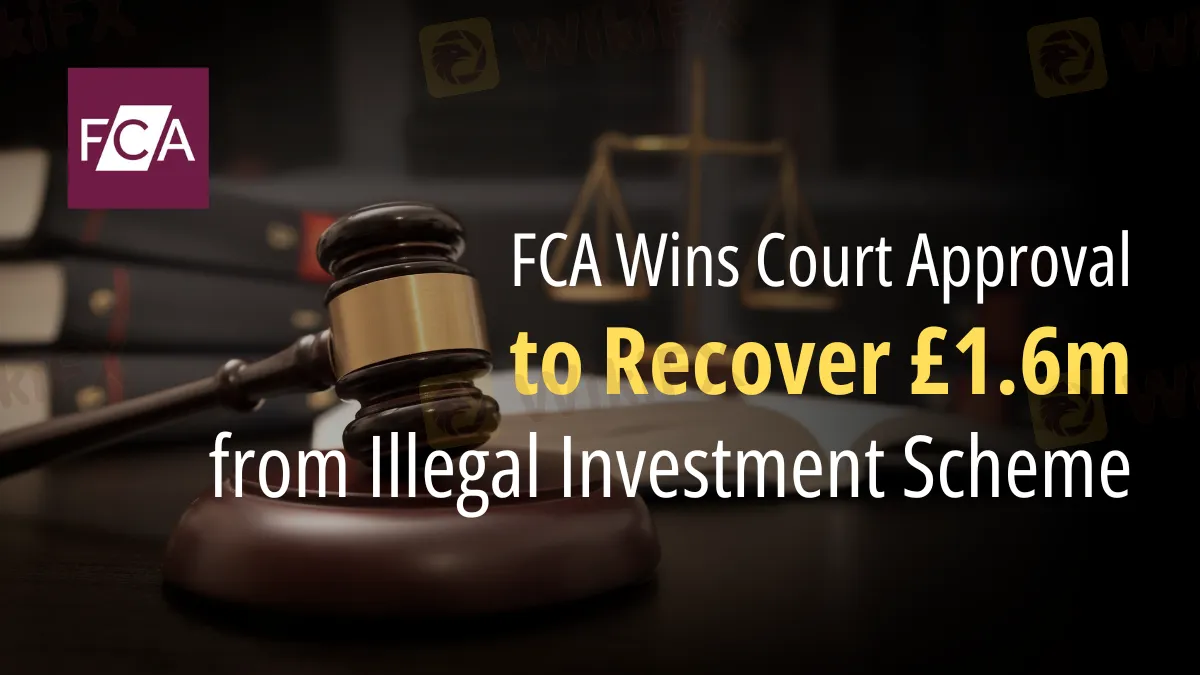简体中文
繁體中文
English
Pусский
日本語
ภาษาไทย
Tiếng Việt
Bahasa Indonesia
Español
हिन्दी
Filippiiniläinen
Français
Deutsch
Português
Türkçe
한국어
العربية
FCA Wins Court Approval to Recover £1.6m from Illegal Investment Scheme
Abstract:The Financial Conduct Authority has successfully obtained court approval to recover £1.6 million from Argento Wealth Ltd. and its director for promoting illegal investment schemes, aiming to return funds to investors.

The UK (FCA) receives court approval to recover £1.6 million from Argento Wealth Ltd. (AWL) and its solitary director, Mr. Daniel Willis. This advancement signifies a substantial progression in the disciplined pursuits of the FCA to protect investors and maintain the integrity of the market.
The FCA's action against AWL and Mr. Willis derives from their promotion of illegal investment enterprises, including £2.8 million in deposits under loan agreements or as part of an unauthorized collective investment scheme. Furthermore, the regulator cited AWL's arrangement of investments in EMB Fund Limited (EMB), totaling about US$9 million, as violating financial promotion limits.
The FCA's action against AWL and Mr. Willis derives from their promotion of illegal investment enterprises, including the receipt of about £2.8 million in deposits under loan agreements or as part of an unauthorized collective investment scheme. Furthermore, the regulator cited AWL's arrangement of investments in EMB Fund Limited (EMB), totaling about US$9 million, as violating financial promotion limits. Mr. Willis is accused of being knowingly involved in the illegal actions.

The FCA's past success in obtaining undertakings that essentially froze AWL and Mr. Willis' assets serves as a background to this judicial case. The FCA's preemptive move helped pave the road for the latest court ruling, highlighting the regulator's commitment to safeguarding investors from potentially exploitative activities.
The FCA settlement was carefully planned to prevent the depletion of AWL's and Mr. Willis' residual assets for legal and living costs. Without this agreement, there was a real possibility that the remaining funds meant for investors would be devoured by continuous litigation bills, leaving victims with little recourse for compensation. Despite this precaution, the FCA cautions that investors may suffer “very significant losses,” stressing the serious consequences of the suspected illegal action for the people involved.
This case highlights the importance of regulating authorities like the FCA in safeguarding financial markets and investors. The FCA displays its commitment to combating unapproved and illegal financial schemes by providing diligent monitoring and a readiness to seek legal action where required. While the legal procedure is complex and possibly time-consuming, it is a crucial step toward getting justice for the aggrieved investors and establishing the concept that financial malfeasance will not go unchallenged.
As the legal proceedings advance, the major focus is on fairly distributing the confiscated assets to the investors who lost money due to their involvement in the scams advocated by AWL and Mr. Willis. Due to the gravity of the problems and complexity inherent in controlling the ever-changing landscape of investment schemes, the result of this case is bound to attract considerable attention.
About FCA
The Financial Behavior Authority (FCA) of the United Kingdom is a regulatory organization in charge of supervising financial businesses' behavior to maintain market integrity. It seeks to safeguard customers, maintain industry stability, and foster healthy competition among financial service providers. For consumer services and UK financial market integrity, the FCA may monitor financial institutions.

Disclaimer:
The views in this article only represent the author's personal views, and do not constitute investment advice on this platform. This platform does not guarantee the accuracy, completeness and timeliness of the information in the article, and will not be liable for any loss caused by the use of or reliance on the information in the article.
Read more

Tokyo Police Arrest 4 for Unregistered FX Trading Scheme
Four men in Tokyo were arrested for running an unregistered FX trading operation, collecting over ¥1.6 billion from 1,500 investors.

Doo Group Expands Its Operations with CySEC License
Doo Financial, part of Doo Group, receives a CySEC license, allowing FX/CFD services in Europe. This strengthens its global presence and regulatory standards.

US Regulators Tighten Oversight on Bank Anti-Money Laundering Efforts
US regulators warn banks of stricter enforcement on money laundering rules, highlighting recent penalties against major lenders like TD Bank.

Exness: Revolutionizing Trading with Cutting-Edge Platforms
Exness offers traders seamless experiences with its Exness Terminal and Exness Trade app, providing flexibility, advanced tools, and low-cost trading.
WikiFX Broker
Latest News
Why Even the Highly Educated Fall Victim to Investment Scams?
Warning Against Globalmarketsbull & Cryptclubmarket
BSP Shuts Down Uno Forex Over Serious AML Violations
ACY Securities Expands Global Footprint with South Africa Acquisition
Tokyo Police Arrest 4 for Unregistered FX Trading Scheme
Rupee gains against Euro
Axi Bids AUD 52M to Acquire Low-Cost Broker SelfWealth, Outbidding Competitor Bell Financial
Crypto Influencer's Body Found Months After Kidnapping
US Regulators Tighten Oversight on Bank Anti-Money Laundering Efforts
Doo Group Expands Its Operations with CySEC License
Currency Calculator


